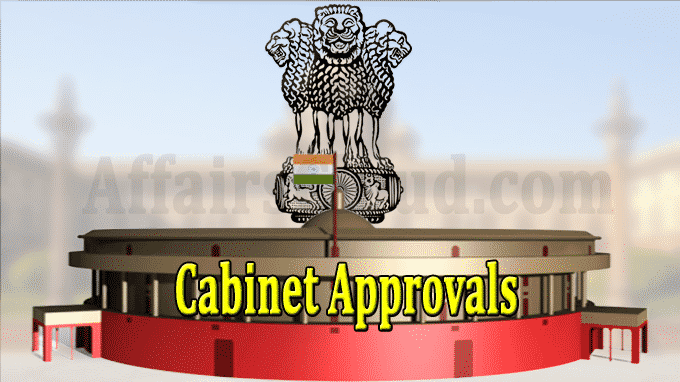 On June 24, 2020, Union Cabinet chaired by the Prime Minister, Narendra Modi has given its approval to the following proposals:
On June 24, 2020, Union Cabinet chaired by the Prime Minister, Narendra Modi has given its approval to the following proposals:
–Cabinet approves declaration of Kushinagar Airport in Uttar Pradesh as an International Airport
The Union Cabinet has given its assent for the declaration of airport in Uttar Pradesh’s (UP) Kushinagar as an international airport. The reason behind this move is to provide improved connectivity to Kushinagar, an important Buddhist pilgrimage site, located in the north-eastern part of UP. The town has pilgrimage sites in Lumbini, Shravasti, Kapilvastu nearby it. A little farther, it has sites in Sarnath and Gaya.
- It is to be noted that Gautama Buddha attained Mahaparinirvana after his death at Kushinagar.
- A 3-km-long runway strip has already been made. Now, even a big aircraft of Airbus can land at the airport.
About UP:
Chief Minister (CM)– Yogi Adityanath
Capital– Lucknow
Governor– Anandiben Mafatbhai Patel
Union Cabinet Approves Term Extension Of Commission To Examine Sub-Categorization Of OBCs till Jan 31, 2021
Cabinet has approved the further extension of the term of the Commission formulated under Article 340 of the constitution to examine the issue of Sub-categorization of Other Backward Classes (OBCs), by 6 months i.e. upto January 31, 2021 from earlier July 31, 2020.
- The Commission is likely to make recommendations for the benefit of communities in the existing list of OBCs which have not been able to get any major benefit of the scheme of reservation for OBCs for appointment in Central Government posts and for admission in Central Government Educational Institutions.
Background:
In October 2017, the commission was instituted under the chairmanship of Justice (Retd.) G. Rohini. However, the Commission required some more time to submit its report due the errors appearing in the existing Central List of OBCs. Hence the Commission had sought extension of its term, up to 31st July 2020. But due to the nationwide lockdown the commission needed further extension up to 31.1.2021, which is now approved by the Cabinet.
–Historic Reform: Private sector participation in Space activities approved
In a major reform, the Union Cabinet has approved the participation of the private sector in the entire range of space activities, including planetary exploration missions. This information has been revealed by Minister of State (MoS) for Prime Minister’s Office (PMO) Jitendra Singh. The Department of Space comes under the PMO.
- As a part of this approval, the newly-created Indian National Space Promotion and Authorisation Centre (IN-SPACe) will guide private enterprise participation in space activities and the use of the country’s space infrastructure.
- Also, the Public Sector Enterprise (PSE) ‘New Space India Limited (NSIL)’ will endeavour to re-orient space activities from a ‘supply driven’ model to a ‘demand driven’ model, to ensure optimum utilization of our space assets.
- This approval is on the lines of the announcement by Finance Minister Nirmala Sitharaman about opening up of the space sector for private entities.
Benefits:
-Acceleration of growth in space by enabling Indian Industry to be an important player in global space economy.
-Provide opportunity for large-scale employment in the technology sector and India becoming a global technology powerhouse.
-These reforms will allow Indian Space Research Organisation (ISRO) to focus more on research and development activities, new technologies, exploration missions and human spaceflight programme.
About NSIL:
Headquarter– Bengaluru, Karnataka
Chairman-Managing Director CMD)– G. Narayanan
About ISRO:
Headquarter– Bengaluru, Karnataka
Chairman– Kailasavadivoo Sivan
–2% Interest Subvention approved on prompt repayment of Shishu Loans under PMMY for 12 months
The Cabinet has also approved a scheme for interest subvention of 2% for a period of 12 months to all Shishu loan accounts under Pradhan Mantri Mudra Yojana (PMMY) to eligible borrowers w.e.f. June 01, 2020 till May 31, 2021. The estimated cost of the Scheme is approximately Rs 1,542 crore and will be implemented through the Small Industries Development Bank of India (SIDBI).
- Eligibility: The scheme will be extended to loans outstanding as on 31st March, 2020; and not in Non-Performing Asset (NPA) category, as per Reserve Bank of India (RBI) guidelines, on 31st March 2020 and during the period of operation of the Scheme.
Key Points:
-The interest subvention would be payable for the months in which the accounts are not in NPA category including for the months that the account becomes a performing asset again, after turning NPA.
– The move is aimed at helping the Micro, Small and Medium Enterprises (MSMEs) amid COVID-19 crisis and will also incentivize people who will make regular repayments of loans.
About PMMY:
Launched on April 8, 2015 the scheme provides loan up-to 10 lakhs to the non-corporate, non-farm small/micro enterprises. The loans provided under PMMY are classified as MUDRA (Micro Units Development & Refinance Agency Ltd) loans. The loan coverage is classified under these three products.
- Shishu: Covers loan up-to 50, 000.
- Kishore: Covers loan from Rs 50,000 and up to Rs. 5 lakhs.
- Tarun: Covers loan from Rs 5 lakh and up to Rs. 10 lakhs.
The loan is provided by commercial banks, Regional Rural Banks (RRBs), Small Finance Banks (SFB), MFIs (Micro Finance Institutions) and NBFCs (Non-Banking Financial Institution).
Click Here to read more about PMMY
–Cabinet approves establishment of Animal Husbandry Infrastructure Development Fund worth Rs. 15000 cr
On the lines of the 20 Lakh cr Atma Nirbhar Bharat Abhiyan stimulus package, the Cabinet Committee on Economic Affairs (CCEA) has approved setting up of Animal Husbandry Infrastructure Development Fund (AHIDF) worth Rs. 15000 crore to incentivize MSMEs and private companies participation in the animal husbandry sector .
- Earlier, the centre has approved the Dairy Infrastructure Development Fund (DIDF) worth Rs 10,000 crores for incentivizing investment by the cooperative sector for the development of dairy infrastructure.
Key Points:
-Government of India will provide 3% interest subvention to eligible beneficiaries.
-There will be a 2 years moratorium period for repayment of loan with 6 years repayment period thereafter.
-The central government will also set up a Credit Guarantee Fund of Rs 750 crore to be managed by National Bank for Agriculture and Rural Development (NABARD) which would provide credit guarantee to the projects which are covered under the MSME defined ceilings. Guarantee Coverage would be up to 25% of the Credit facility of the borrower.
Beneficiaries:
The AHIDF would provide incentive infrastructure investments in dairy, meat processing and animal feed plants. The eligible beneficiaries under the scheme would be Farmer Producer Organizations (FPOs), MSMEs, Section 8 Companies, Private Companies and individual entrepreneurs with only 10% margin money contribution by them. The balance 90% would be the loan component to be made available to them by scheduled banks.
About NABARD:
Headquarters– Mumbai, Maharashtra
Chairman– G R Chintala
–Cabinet approves additional investment of US$ 121.27 mn by ONGC Videsh Ltd. for development of blocks A-1 and A-3 of Myanmar
The CCEA has approved additional investment of US$ 121.27 million (about Rs.909 crore) by ONGC Videsh Ltd (OVL) towards further development of blocks A-1 and A-3 Blocks of Shwe oil & gas project in Myanmar.
- OVL, the overseas arm of state-owned Oil and Natural Gas Corp (ONGC), had picked up a stake in the Shwe Project in Myanmar in 2002, as part of a consortium of companies from South Korea, India and Myanmar. The firm has invested USD 722 million in the project till March 31, 2019.
The participation of Indian PSUs in oil & gas exploration and development projects in neighbouring countries is aligned with India’s Act East Policy.
About OVL:
Chairman & Managing Director (CMD)– Shashi Shanker
Headquarter– New Delhi
–Urban, multi-State cooperative banks to come under RBI supervision
The Cabinet has approved an ordinance to bring nearly 1,482 urban and 58 multi state cooperative banks under the Reserve Bank of India’s (RBI) supervision. Therefore, RBI’s power applied to scheduled banks, will now apply for cooperative banks as well. This information has been revealed by Union Minister of Information and Broadcasting Prakash Javadekar.
- It will give an assurance to 8.6 crore depositors, who have saved Rs 4.84 lakh crore in these banks, that their money will stay safe.
Key Points:
-Currently, these banks come under dual regulation of the RBI and the Registrar of Co-operative Societies (RCS).
-The move has been taken after several instances of fraud and serious financial irregularities, including the major scam at the Punjab and Maharashtra Co-operative (PMC) Bank in 2019. Finance Minister Nirmala Sitharaman also announced the government’s intention to bring co-operative banks under the RBI’s supervision in Budget 2020.
About Reserve Bank of India (RBI):
Headquarters– Mumbai, Maharashtra
Formation– 1 April 1935
Governor– Shaktikanta Das
Deputy Governors– 4 (Bibhu Prasad Kanungo, Mahesh Kumar Jain, Michael Debabrata Patra, one is yet to be appointed).




